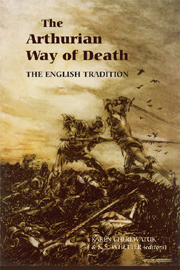Book contents
- Frontmatter
- Contents
- Illustrations and Tables
- Dedication
- List of Contributors
- Introduction
- Part I The early Tradition in england
- Part II Middle English Romance and Malory
- Part III Medieval Influence and Modern Arthuriana
- 10 Arthurian Exits: Alone, Together, or None of the Above
- 11 Woman as Agent of Death in Tennyson's Idylls of the King
- 12 Death as ‘Neglect of Duty’ in Howard Pyle's The Story of the Grail and the Passing of Arthur
- 13 Death and the ‘grimly voice“ in David Jones's In Parenthesis
- 14 Roll the Final Credits: Some Notes on Cinematic Depictions of the Death of Arthur
- Index
- Arthurian Studies
13 - Death and the ‘grimly voice“ in David Jones's In Parenthesis
from Part III - Medieval Influence and Modern Arthuriana
Published online by Cambridge University Press: 12 September 2012
- Frontmatter
- Contents
- Illustrations and Tables
- Dedication
- List of Contributors
- Introduction
- Part I The early Tradition in england
- Part II Middle English Romance and Malory
- Part III Medieval Influence and Modern Arthuriana
- 10 Arthurian Exits: Alone, Together, or None of the Above
- 11 Woman as Agent of Death in Tennyson's Idylls of the King
- 12 Death as ‘Neglect of Duty’ in Howard Pyle's The Story of the Grail and the Passing of Arthur
- 13 Death and the ‘grimly voice“ in David Jones's In Parenthesis
- 14 Roll the Final Credits: Some Notes on Cinematic Depictions of the Death of Arthur
- Index
- Arthurian Studies
Summary
The Great War of 1914–18 wiped out eight million lives; eight million lives lost in a war that marked the end of a perception of history as ‘involving a coherent stream of time running through past through present to future’. Paul Fussell's landmark study of the period evokes this shift by illustrating how idyllic the summer was in 1914 before hostilities commenced. The picture he paints is an English pastoral romance: tea in the garden, walks and picnics in the countryside, sunny, balmy days when Siegfried Sassoon was playing cricket and Robert Graves was climbing in the Welsh mountains. It was a world that still held certain concepts, such as Honour and Glory, permanent and reliable markers of civilization, endorsed by the literary works of Kipling, Hardy, and Conrad, and undisturbed as yet by the modernist reactions of Joyce, Eliot, and Pound.
This is the landscape threatened by the terrors of a war fought by men ill-equipped and ill-prepared to face what was asked of them; the landscape they fought for while on foreign soil that was in many ways nostalgically reminiscent of home. This was the ethical and cultural landscape shored up by centuries of a literary heritage that was itself to play an important part in keeping up morale. Arthur Quiller-Couch's Oxford Book of English Verse was a constant companion in many soldiers' backpacks, and to open Robert Bridges's anthology, The Spirit of Man, published in 1916, is to find, explicitly expressed, an insistence on remembering the roll call of 'seers and poets of mankind, whose sayings are the oracles and prophecies of loveliness and lovingkindness’.
- Type
- Chapter
- Information
- The Arthurian Way of DeathThe English Tradition, pp. 226 - 240Publisher: Boydell & BrewerPrint publication year: 2009



